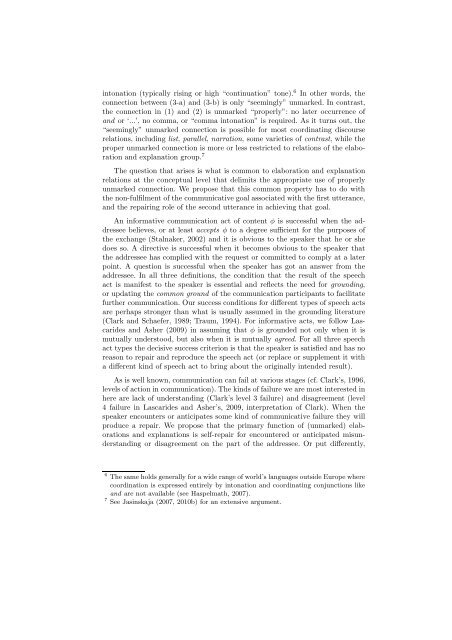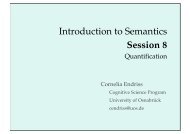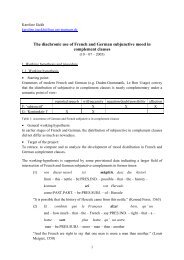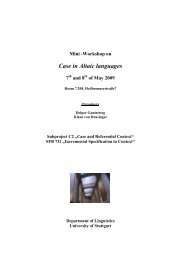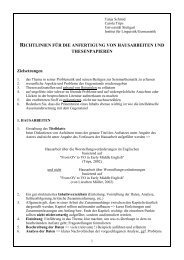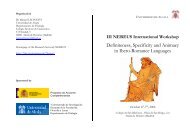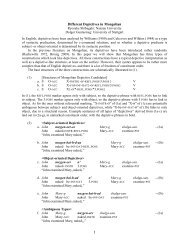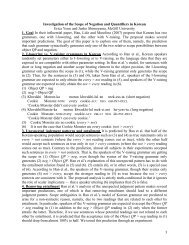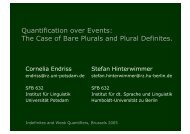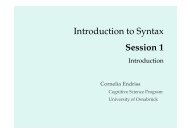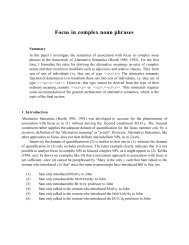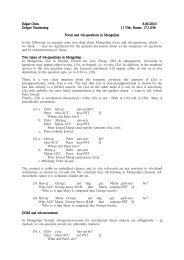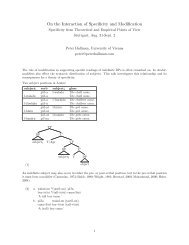Elaboration and Explanation* - Inria
Elaboration and Explanation* - Inria
Elaboration and Explanation* - Inria
You also want an ePaper? Increase the reach of your titles
YUMPU automatically turns print PDFs into web optimized ePapers that Google loves.
intonation (typically rising or high “continuation” tone). 6 In other words, the<br />
connection between (3-a) <strong>and</strong> (3-b) is only “seemingly” unmarked. In contrast,<br />
the connection in (1) <strong>and</strong> (2) is unmarked “properly”: no later occurrence of<br />
<strong>and</strong> or ‘...’, no comma, or “comma intonation” is required. As it turns out, the<br />
“seemingly” unmarked connection is possible for most coordinating discourse<br />
relations, including list, parallel, narration, some varieties of contrast, while the<br />
proper unmarked connection is more or less restricted to relations of the elaboration<br />
<strong>and</strong> explanation group. 7<br />
The question that arises is what is common to elaboration <strong>and</strong> explanation<br />
relations at the conceptual level that delimits the appropriate use of properly<br />
unmarked connection. We propose that this common property has to do with<br />
the non-fulfilment of the communicative goal associated with the first utterance,<br />
<strong>and</strong> the repairing role of the second utterance in achieving that goal.<br />
An informative communication act of content φ is successful when the addressee<br />
believes, or at least accepts φ to a degree sufficient for the purposes of<br />
the exchange (Stalnaker, 2002) <strong>and</strong> it is obvious to the speaker that he or she<br />
does so. A directive is successful when it becomes obvious to the speaker that<br />
the addressee has complied with the request or committed to comply at a later<br />
point. A question is successful when the speaker has got an answer from the<br />
addressee. In all three definitions, the condition that the result of the speech<br />
act is manifest to the speaker is essential <strong>and</strong> reflects the need for grounding,<br />
or updating the common ground of the communication participants to facilitate<br />
further communication. Our success conditions for different types of speech acts<br />
are perhaps stronger than what is usually assumed in the grounding literature<br />
(Clark <strong>and</strong> Schaefer, 1989; Traum, 1994). For informative acts, we follow Lascarides<br />
<strong>and</strong> Asher (2009) in assuming that φ is grounded not only when it is<br />
mutually understood, but also when it is mutually agreed. For all three speech<br />
act types the decisive success criterion is that the speaker is satisfied <strong>and</strong> has no<br />
reason to repair <strong>and</strong> reproduce the speech act (or replace or supplement it with<br />
a different kind of speech act to bring about the originally intended result).<br />
As is well known, communication can fail at various stages (cf. Clark’s, 1996,<br />
levels of action in communication). The kinds of failure we are most interested in<br />
here are lack of underst<strong>and</strong>ing (Clark’s level 3 failure) <strong>and</strong> disagreement (level<br />
4 failure in Lascarides <strong>and</strong> Asher’s, 2009, interpretation of Clark). When the<br />
speaker encounters or anticipates some kind of communicative failure they will<br />
produce a repair. We propose that the primary function of (unmarked) elaborations<br />
<strong>and</strong> explanations is self-repair for encountered or anticipated misunderst<strong>and</strong>ing<br />
or disagreement on the part of the addressee. Or put differently,<br />
6 The same holds generally for a wide range of world’s languages outside Europe where<br />
coordination is expressed entirely by intonation <strong>and</strong> coordinating conjunctions like<br />
<strong>and</strong> are not available (see Haspelmath, 2007).<br />
7 See Jasinskaja (2007, 2010b) for an extensive argument.


